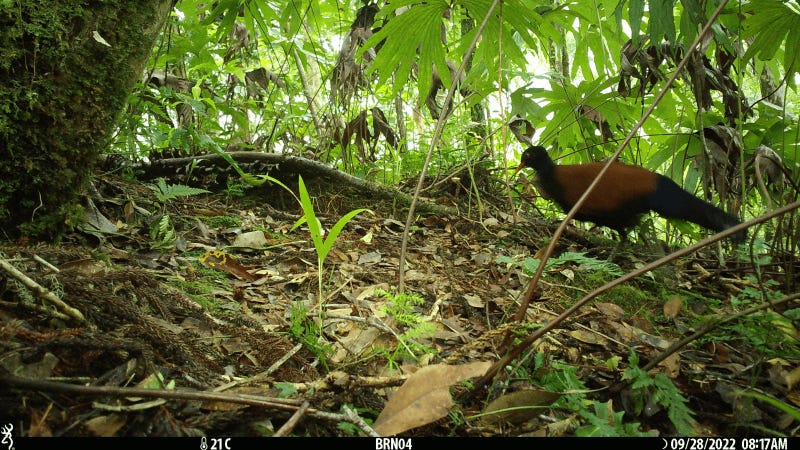
An elusive bird that was thought to be extinct for 140 years was just captured on video for the first time since 1882.
A team of scientists and conservationists in September rediscovered the elusive Black-naped Pheasant-Pigeon -- a large, ground-dwelling pigeon that only lives on Fergusson Island in Papua New Guinea -- after staking out the rugged island for a month.
The bird, which closely resembles a pheasant, has been observed several times over the years by local hunters, but the newly taken photographs and video are the first time it has been documented by scientists since 1882, when it was first discovered, according to the American Bird Conservancy.
The research team photographed the pheasant-pigeon with a remote camera trap at the end of a month-long search of Fergusson.
"When we collected the camera traps, I figured there was less than a one-percent chance of getting a photo of the Black-naped Pheasant-Pigeon," Jordan Boersma, co-leader of the expedition team, said in a statement. "Then as I was scrolling through the photos, I was stunned by this photo of this bird walking right past our camera."
The expedition team -- which included local Papua New Guineans working with Papua New Guinea National Museum, Cornell Lab of Ornithology, and the American Bird Conservancy -- spent a month placing 12 camera traps on the slopes of Mt. Kilkerran, Fergusson's highest mountain, and deployed an additional eight cameras in locations where local hunters had reported seeing the pheasant-pigeon in the past.
The steep, mountainous terrain on Fergusson Island made searching for the bird extremely challenging. But the payoff was great -- cameras captured the pheasant-pigeon walking on the forest floor two days before the team was scheduled to leave the island.
Expedition co-leader John C. Mittermeier said it "felt like finding a unicorn."
"It is the kind of moment you dream about your entire life as a conservationist and birdwatcher," he said.
The team's findings suggest that the pheasant-pigeon is likely to be extremely rare. The rugged and inaccessible forest where the bird was rediscovered could be the last stronghold for the species on the island. The goal now is to provide a plan for protection.
"This rediscovery is an incredible beacon of hope for other birds that have been lost for a half century or more," said Christina Biggs, Manager for the Search for Lost Species at Re:wild. "The terrain the team searched was incredibly difficult, but their determination never wavered, even though so few people could remember seeing the pheasant-pigeon in recent decades."


